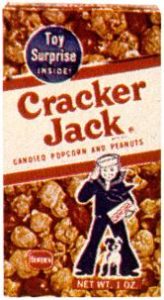Candy-Coated Popcorn, Peanuts—and WHAT?!?
I’d hazard a guess that most US natives between the ages of 40-80 can still sing the jingle: “Candy-coated popcorn, peanuts and a prize. That’s what you get with Cracker Jack.” It was a big part of our childhoods, back in the days when three TV networks controlled the entire universe of video and national advertisers bought saturation advertising programs that aired the same commercial many times a day. Cracker Jack was immortalized in the song “Take Me Out to the Ballgame” in 1908, started bundling the prize way back in 1912, and began its national TV advertising in 1955.

It didn’t matter that the prize was something worth about 2 cents, something not even worthy of being called a tchochke. It was the thrill of the hunt, searching through all that icky sticky stuff to locate the prize—and the thrill of mystery, never knowing what, umm, “treasure” you’d find. Sometimes it would be something really cool, like a spy decoder ring. But like any other grab-bag item, sometimes it was truly worthless. I knew kids who bought CrackerJack just to get that prize.
At that time, the company was owned by Borden, whose Elsie the Cow was another advertising icon of the period. It’s now owned by Pepsico’s Frito-Lay division
Well, here’s some shocking news: Despite its wildly successful run of more than 100 years, the Cracker Jack toy is now an endangered species. As Bob Dylan sang during the Cracker Jack saturation TV period, “The times, they are a changing.” Cracker Jack is replacing the “tchochkette” (if I can coin a word that merges Yiddish and French) with a slip of paper bearing a QR code!
I’m sorry, but that is just not the same. From a branding point of view, I think it’s a huge error. Cracker Jack’s whole brand is built around nostalgia, Americana, baseball, and that unforgettable jingle. Sure, digital natives will redeem their QR codes and not think twice about it. But they won’t know what they’re missing. And those who can’t afford or choose not to use smartphones are left out entirely. Plus, their kids will never hear their parents scream at a bad driver, “Did you get your license in a Cracker Jack box?” A piece of American culture is disappearing.
In Cracker Jack’s earliest days, during a baseball corruption scandal known as the Chicago Black Sox scandal, a fan reportedly went up to the legendary Shoeless Joe Jackson and begged, “Say it ain’t so, Joe!” Maybe now, we need to say, “Get back on the track, Jack!”
